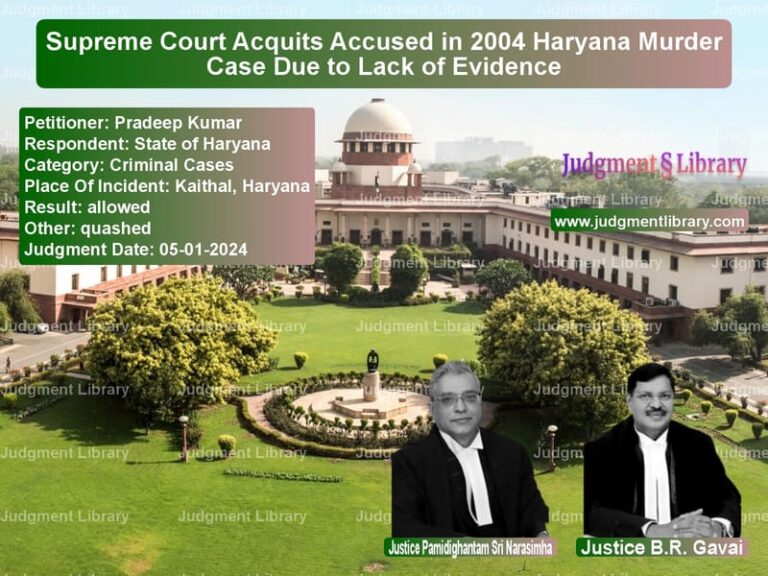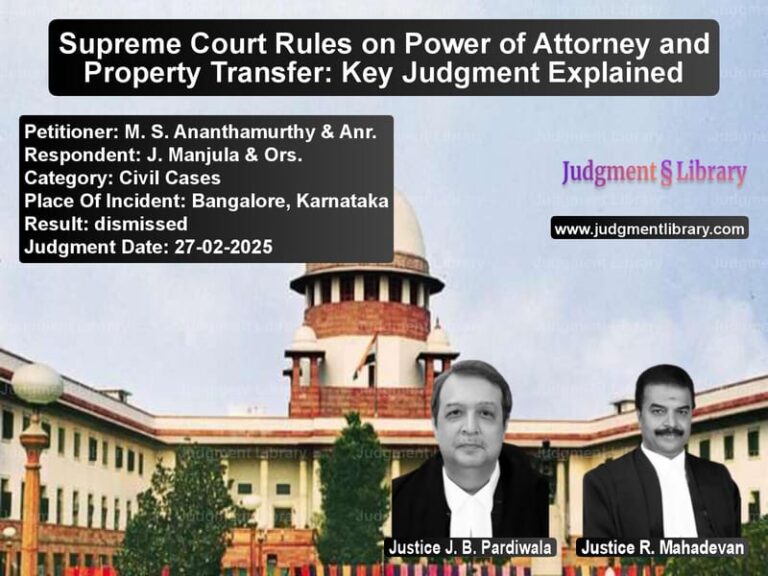Supreme Court Directs Three Acres to Legal Heirs in Partnership Firm Dispute
The Supreme Court of India, in the case Usha Gopirathnam & Ors. v. P.S. Ranganathan (D) Thru. LRs & Ors., adjudicated a dispute involving the dissolution of a partnership firm and the distribution of assets. The case centered on whether the legal heirs of a deceased partner, Gopirathnam, were entitled to a share in the firm after his death, particularly when a retirement was acknowledged years prior.
Background of the Case
The case traces back to January 1, 1966, when a partnership deed was executed between Late Mr. Gopirathnam, Mr. P.S. Ranganathan, Mr. Lavakumar, and Mr. Basanth Kumar. The partnership firm, M/s. High Clere Stud and Agricultural Farm, was set up with the aim of breeding livestock and conducting agricultural activities. Despite initial success, financial difficulties soon ensued, resulting in the firm’s bankruptcy and the eventual dissolution of the partnership.
Gopirathnam sent a letter on March 29, 1973, expressing his desire to retire from the firm, which was accepted by Mr. Ranganathan on April 15, 1973. Gopirathnam was subsequently paid ₹20,000 as full and final settlement. However, in 2000, the legal heirs of Gopirathnam filed a civil suit seeking the dissolution of the firm, division of its assets, and rendition of accounts.
Read also: https://judgmentlibrary.com/unregistered-agreement-to-sell-supreme-court-rules-on-property-dispute/
Legal Issues
- Did Gopirathnam retire from the partnership in 1973?
- Were the legal heirs of Gopirathnam entitled to claim partnership rights after his retirement?
- Was the suit for dissolution of the partnership filed beyond the limitation period?
Arguments by the Petitioners (Legal Heirs of Gopirathnam)
The petitioners argued that:
- There was no valid retirement in 1973 because Gopirathnam’s signature on the letter expressing his intention to retire was disputed.
- They were entitled to partnership rights by virtue of Clause 17 of the partnership deed, which allowed heirs to become partners upon the death of a partner.
- The suit was filed within the prescribed limitation period, as Gopirathnam’s death occurred in 1997, and the legal heirs sought their share in the firm.
Arguments by the Respondents (Ranganathan and Other Partners)
The respondents contended that:
- Gopirathnam had indeed retired from the firm in 1973, and the petitioners could not claim partnership rights after his retirement.
- The legal heirs did not assert their rights as partners in the firm until much later, making their claim barred by limitation.
- Gopirathnam had effectively retired when the firm was facing financial difficulties, and his retirement was accepted by all partners.
Supreme Court’s Observations
The Supreme Court, comprising Justice B.R. Gavai and Justice Pamidighantam Sri Narasimha, made the following key observations:
1. Validity of Retirement in 1973
The Court ruled that Gopirathnam’s retirement was valid, given the absence of any protest from him after the payment in 1973 and the lack of evidence suggesting any continuity of his involvement in the firm after that time. It was held that:
“Gopirathnam did not raise any issue regarding his non-participation in the firm’s profits after 1973. His silence and failure to assert any claim for a period of 24 years indicate acceptance of his retirement.”
2. Legal Heirs’ Rights in the Partnership
The Court found that the petitioners could not automatically claim partnership rights under Clause 17 of the partnership deed without taking a positive action to assert those rights. The Court noted:
“Clause 17 does not automatically confer partnership rights to the heirs. It requires a formal act of participation or assertion of rights by the heirs to become partners.”
3. Limitation Period for Filing the Suit
The Court upheld the respondents’ argument that the suit was barred by limitation, as it was filed 27 years after Gopirathnam’s retirement and death. It ruled:
“The suit for dissolution and partition of the partnership firm is barred by limitation as it was not filed within three years from the date of Gopirathnam’s retirement or death.”
Final Judgment
The Supreme Court upheld the decision of the High Court and dismissed the appeal, but provided the following directions:
- The petitioners are entitled to three acres of land out of the eight acres set aside by the Trial Court, the High Court, and this Court. This land includes one acre that was leased to a third party, M/s. Karnataka Dyeing and Processing Company.
- The remaining two acres will be allocated by the respondents as per their discretion, but they must ensure that the land granted to the petitioners is contiguous to the leased land.
- All directions are to be complied with within three months.
Key Takeaways from the Judgment
1. A Partner’s Retirement Must Be Explicitly Acknowledged
The ruling reinforces that retirement from a partnership must be explicitly acknowledged and agreed upon by all partners, and it cannot be implied through silence or inactivity.
2. Heirs Do Not Automatically Become Partners
The Court made it clear that heirs cannot automatically become partners in a firm after the death of a partner unless a formal action is taken by them to assert their rights.
3. Limitation Laws Apply Even in Partnership Disputes
The judgment reaffirms that the law of limitation applies to partnership disputes and that claims must be made within a reasonable time.
Conclusion
The Supreme Court’s decision in Usha Gopirathnam & Ors. v. P.S. Ranganathan (D) Thru. LRs & Ors. addresses crucial issues in partnership law, particularly regarding the retirement of partners, the rights of legal heirs, and the applicability of limitation periods. The Court’s judgment reinforces the importance of formal agreements and actions in partnership disputes and ensures that legal claims are made within an appropriate time frame.
Read also: https://judgmentlibrary.com/adoption-dispute-and-property-rights-a-landmark-judgment/
Petitioner Name: Usha Gopirathnam & Ors..Respondent Name: P.S. Ranganathan (D) Thru. LRs & Ors..Judgment By: Justice B.R. Gavai, Justice Pamidighantam Sri Narasimha.Place Of Incident: Bangalore, Karnataka.Judgment Date: 23-09-2022.
Don’t miss out on the full details! Download the complete judgment in PDF format below and gain valuable insights instantly!
Download Judgment: usha-gopirathnam-&-o-vs-p.s.-ranganathan-(d)-supreme-court-of-india-judgment-dated-23-09-2022.pdf
Directly Download Judgment: Directly download this Judgment
See all petitions in Contract Disputes
See all petitions in Property Disputes
See all petitions in Succession and Wills
See all petitions in Judgment by B R Gavai
See all petitions in Judgment by P.S. Narasimha
See all petitions in dismissed
See all petitions in settled
See all petitions in supreme court of India judgments September 2022
See all petitions in 2022 judgments
See all posts in Civil Cases Category
See all allowed petitions in Civil Cases Category
See all Dismissed petitions in Civil Cases Category
See all partially allowed petitions in Civil Cases Category







